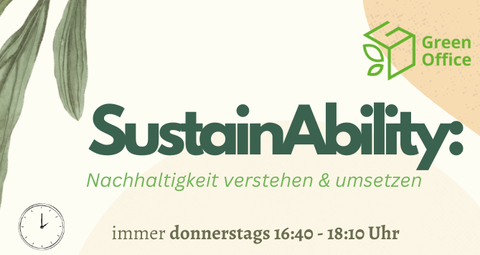Oct 08, 2024
Sustainability education in the winter semester 2024/25 for students and interested parties
Exciting courses await students and interested parties in the winter semester:
"SustainAbility - Understanding and Implementing Sustainability" provides a basic insight into the topic of sustainability and takes place every Thursday from 4.40 to 6.10 pm in Gerber-Bau, room 38 or online. More information: https: //tu-dresden.de/tu-dresden/nachhaltigkeit/mitmachen/veranstaltungen/grundvorlesung-oekologische-nachhaltigkeit
Every Monday between 16.40 and 18.10 you can listen to the lecture "Sustainable model projects - What does the East have to offer?" in the Auditorium Center, room 201. Media coverage of eastern Germany is often characterized by political sentiment, election results and displeasure, which is understandable... East Germany has more to offer! People here are working on and thinking about new ideas and modern concepts, models that can make our world more sustainable and worth living in. In this lecture series, people present exciting projects and ventures and try to make life and the environment a little more beautiful and sustainable. More information: https://bildungsportal.sachsen.de/opal/auth/RepositoryEntry/46174404610
Anyone who wants to find out more about "Sustainability in everyday life" has the opportunity to do so every Wednesday between 4.40 and 6.10 p.m. in Auditorium Center, Room 401. Buying food in organic or unpackaged stores, wearing fair fashion and only owning electrical appliances with energy efficiency class A. Is this possible for everyone in everyday life or is it a privilege that only wealthy people can afford? In times of resource scarcity and increasing waste, the question is: What can I do as an individual? Where should I start and how much effect will my efforts have? To make the introduction to the topic simple and tangible, everyday consumer goods are examined in more detail: Food, (drinking) water and plastic. Does it make sense to save packaging in an unpackaged store if the products are delivered in large containers? Where does our drinking water in Dresden come from and how sustainably is the waste water treated? What happens to leftover food in the canteens? Not every solution advertised as sustainable delivers what it promises. Is what is presented to us as environmentally friendly really that sustainable or is it just greenwashing? With a combination of practical approaches and a scientific perspective, we want to get closer to a sustainable everyday life. More information: https://bildungsportal.sachsen.de/opal/auth/RepositoryEntry/46198325257
You can also obtain a sustainability education certificate with the studium oecologicum. Simply attend educational events in the studium-generale catalog that are marked with the corresponding emblem.
Take a look at https://tu-dresden.de/studiumgenerale

